9 Best Inventory Management Software [2024]
Using inventory management software can be very helpful for any business. It can help automate processes, track everything within your company. Plus, it can boost profits. Regardless of your niche, the best inventory management software will always help.
Here we have a list of the best inventory management softwares.
We will also show how you can make the right choice for your business.
What is an Inventory Management Software?
Inventory management software helps check your stock. It will also help you automate processes like ordering low-stock products. It interlinks with your POS and accounting systems. You will have an excellent way to track your POS and ensure it all works.
That way, you can fully manage your inventory. It also helps you avoid situations when you lack any product people need.
It helps track sales, orders, and deliveries. It can help create a bill of materials, and a work order. You can also use it to manage your production systems. The software can organize your data while preventing product outages.
Plus, you will avoid overstocking problems as well.
Best Inventory Management Software – Comparison |
||||
|---|---|---|---|---|
| Name | Free Trial/Demo | Starting Price | Mobile App | Best For |
| monday.com | 14-day trial | $8 user/month | iOS and Android | Small companies |
| Sortly | 14-day trial | $29/month | iOS and Android | Small businesses, nonprofits, |
| Extensiv | Demo upon request |
Quote only pricing | Android | Dropshipping and Amazon FBA |
| Fishbowl Inventory | 14-day trial | Quote only pricing | iOS and Android | QuickBooks users and larger businesses |
| ShipBob WMS | No | Quote only pricing | iOS | Hybrid fulfillment companies |
| Zoho Inventory | 14-day trial | $59/month | iOS and Android | Smaller businesses |
| Katana | 14-day trial | $99/month | No | Companies looking for a cloud-based inventory app |
| inFlow | 7-day trial | $89/month | iOS and Android | Wholesale businesses and B2B |
| Odoo | Free | Free (paid features) | iOS and Android | Businesses starting up |
Best Inventory Management Software: Overview
1. monday.com
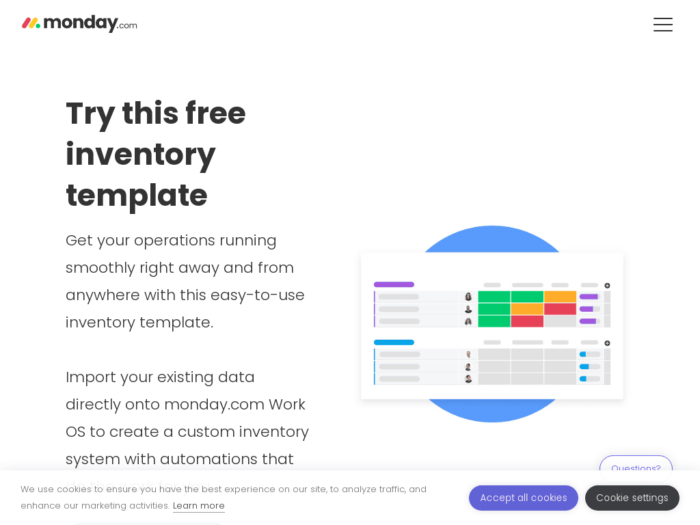
monday.com serves different purposes. It’s suitable for project management but also has inventory management features.
You can use the pre-built inventory management templates in monday. It can help you track warehouse locations, your inventory, and vendors. It’s also possible to import orders from other platforms via Zapier.
monday.com can help your business regardless of its size. Warehouse automation, sales-based forecasting, or barcodes will need widgets. Despite that, if you’re looking for a seamless IMS, monday.com can be ideal.
Pricing:
There is a free version with up to 3 boards, unlimited docs, 200 templates, and 8 column types. Paid versions with more storage. Unlimited items and creating dashboards start at $10 per seat. They can go up to $20 per seat. You can pick team sizes up to 50 seats as well.
Pros:
- The monthly plans are low-cost, and there’s a free plan
- You can expand according to your needs
- Zapier integration
Cons:
- Tracking features are basic
- You will need to use paid add-ons for purchasing and barcode features
Best for: Free inventory management
If you’re a Magento store owner, you can use Magestore POS solutions with rich features like inventory management. It is one of the best inventory management software for retailers, especially selling on the Magento website.
Magestore inventory management system enables merchants to manage inventory accuracy to avoid out-of-stock or overstock status easily, control stocks with barcodes, forecast inventory demand, manage procurement, and get inventory reports for more business performance insights. Thus, your staff can quickly scan and add products during sales, procurement, and inventory counts without wasting time and headaches.
2. Sortly
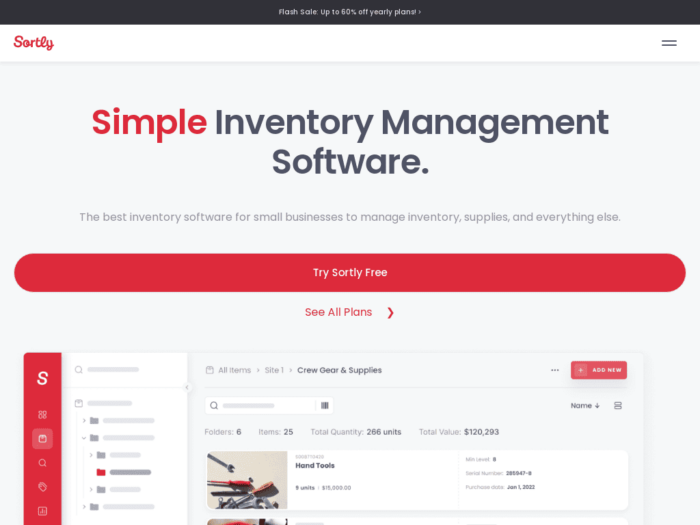
Sortly offers a more simplistic approach toward inventory management. You can use it to manage supplies, track assets, and more.
It can be ideal if you want to manage your product quantities, office supplies, and assets. Sortly doesn’t come with a quick order option.
You can set a notification when you have a low stock, and then order. They have comprehensive email and phone support. You can use filters for clients, products, storage, and other criteria. That makes it much easier to reorder products, manage inventory, and tackle any issues.
Pricing:
The Advanced plan comes at $29/month, and it covers 2000 items, 2 user licenses, and 10 custom fields. Ultra costs $59 a month; it covers 10,000 items and 5 user licenses, along with 25 custom fields. You can ask for a custom, Enterprise package as well.
Pros:
- Very affordable plans
- You can check supplies, tools, equipment
- Barcode system that makes checking stocks much easier
- Scanning QR codes makes inventory management a breeze
Cons:
- There are no shipping or ecommerce integrations built-in
- You can’t automate reordering, which makes it a manual process
Best for: Small businesses, nonprofits, service providers, and personal use.
3. Extensiv

Extensiv is a software to manage inventory for dropshipping businesses. It helps sellers that manage a very high volume of products. It helps manage a multichannel system. It delivers supplier management features, warehousing solutions, and others.
Extensiv syncs across all channels, so you can avoid getting more orders than you can fulfill.
It has complete automation for dropshipping. There’s also API and FTP connections with suppliers. It’s a powerful system for those who need supplier management features. Yet, it also delivers reporting, warehousing, and inventory management.
There’s an ability to sync stocks in real-time. You will find it much easier to automate your workflows and not over-order.
Additionally, Extensiv has auto-send orders, and custom templates. Another advantage of Extensiv is they come with exceptional automation features. They even bring a large knowledge base and tutorials. This is a solution more suitable for high-volume, experienced sellers.
Pricing:
All prices for Extensiv are upon request. The company will always offer specialized pricing according to your needs.
Pros:
- It’s possible to automate your dropshipping costs
- WFS and FBA inventory optimization
- Inventory syncing is very fast and efficient
- Great introductory tools and knowledge base
Cons:
- They don’t have live phone support
- Pricing is not transparent; everything is upon request
- Very expensive and suitable for larger companies only
Best for: Dropshipping and Amazon FBA
4. Fishbowl Inventory
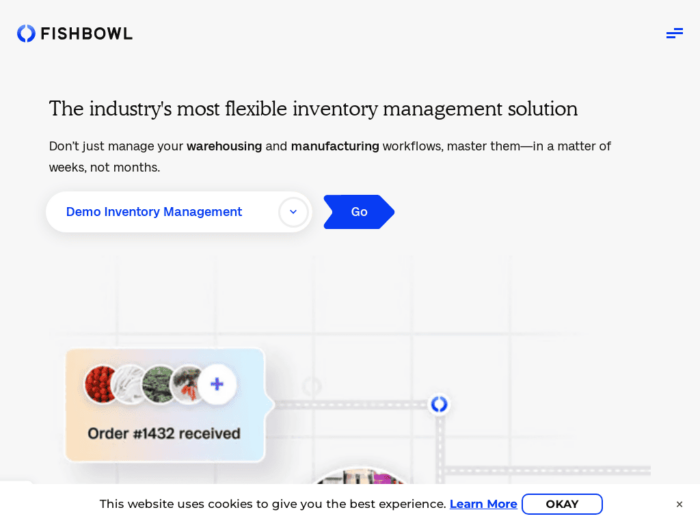
Fishbowl Inventory is known for being one of the most flexible inventory management tools. It’s not the inventory management software free you want, however you can book a demo. In general, Fishbowl Inventory is great for multichannel and ecommerce sellers. It helps you track parts during assembly, storage and fulfillment.
In addition, you have warehousing modules, but also manufacturing modules too.
Since it integrates with QuickBooks, that makes it an exceptionally versatile tool for all types of businesses. They also have other features like barcode tracking. That’s helpful since you can easily identify and manage finished goods, but also parts and your current stock.
Pricing:
Fishbowl Inventory prices start at $329, however you will need to request a demo and contact their sales team. There’s a lack of transparency when it comes to pricing, since every extra feature like business intelligence, hosting, add-on integrations will cost you extra.
Pros:
- You can test Fishbowl Inventory with a 14-day trial
- Professional barcode tracking system
- There are warehousing and manufacturing-specific modules
- Great QuickBooks integration
Cons:
- A lack of transparency in regards to pricing
- Costs are per-user, and it gets very expensive
- Some features are only available as an add-on with separate pricing
Best for: QuickBooks users and larger businesses
5. ShipBob WMS
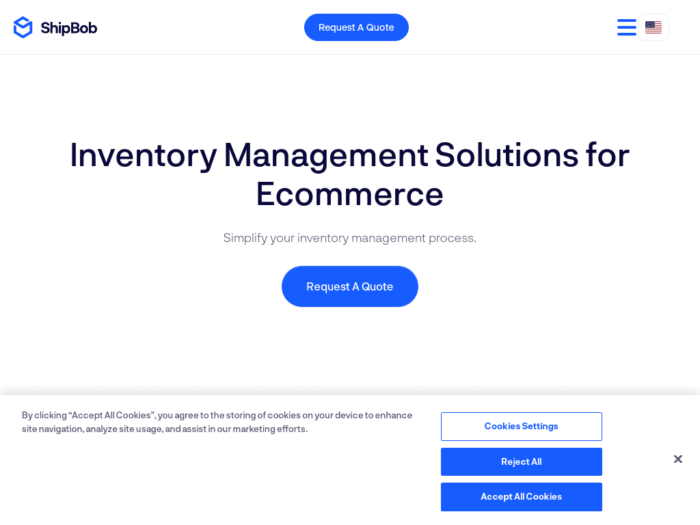
ShipBob is a company with lots of experience within the logistics and fulfillment world. Its ShipBob WMS solution is designed with versatility and scalability in mind. The platform has warehouse and inventory, but also order management.
They also include transportation management, reporting and analytics, open API, white glove implementation and a powerful support system.
When it comes to inventory management specifically, they are very efficient. You can easily track items in stock, and find orders that need fast fulfillment. They also have carrier selection and order routing. You even have a pick and pack system that helps optimize shipping management.
Pricing:
All prices are available upon request, you can have access to a demo with the company and a custom quote.
Pros:
- Access state of the art warehousing and inventory management tools
- Incredible automation systems
- It’s easy to add outsourced fulfillment
- Pick and pack support
- Powerful analytics and reporting system
Cons:
- It has a minimum number of orders per month
- A lack of transparent pricing
- Not a lot of tutorials and online help
Best for: Companies that do hybrid fulfillment, warehousing and shipping tracking
6. Zoho Inventory
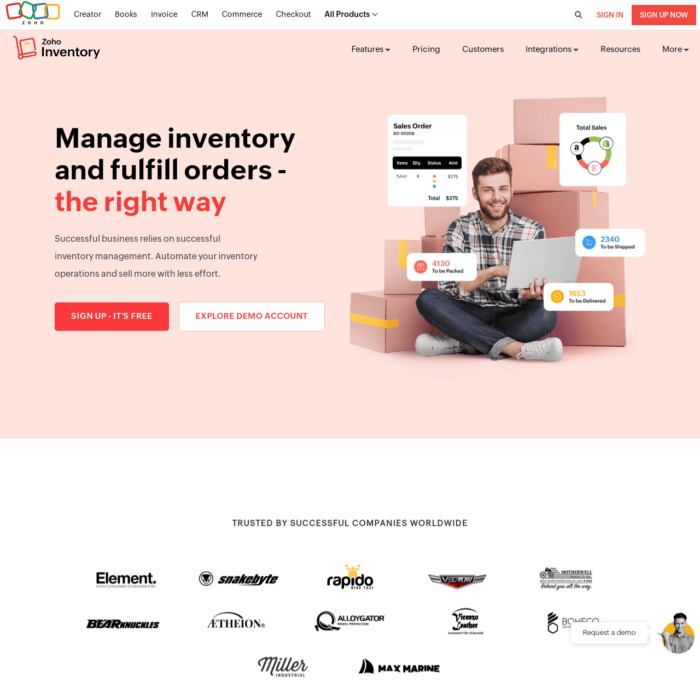
Zoho Inventory is maybe the best warehouse inventory management software. It’s a top tier online inventory management software that’s fully customizable. With its help, you can access warehouse management, automatic ordering, but also order tracking and fulfillment.
They have end to end tracking, along with multiple shipping integrations.
These include Etsy, eBay, Amazon and Shopify, the top sales platforms on the market. Additionally, it integrates with all the other Zoho services. They also have autofill support, along with detailed reports and comprehensive order summary.
From the dashboard you have detailed info like how many purchases were made, what items are in low stock, etc.
You can also see the top selling items, what you need to deliver, or what needs packed. It’s also very easy to see what items are active and what’s not available.
They even show the sales channels and their success. That eliminates any misunderstanding, while saving time. Zoho CRM integration is very efficient.
For example, you can use Magento 2 Zoho CRM extension to do that!
Pricing:
Prices vary based on the number of orders per month and what features you need. Standard covers 1500 orders per month and 1500 shipping labels, it starts at $59. Professional covers 7500 orders and labels, it’s $99 per month and it also includes extra integrations and automation systems. For more features and orders/labels per month, you have Premium at $159, Elite at $239 and $Ultimate at $329.
Pros:
- A very affordable starting price
- Autofill order creation
- Very good integrations with top platforms
- End to end tracking
Cons:
- It lacks some integrations with other platforms
- Growth will force you to upgrade your plan
Best for: Great value for money, suitable for smaller businesses since it has an affordable starting point
7. Katana
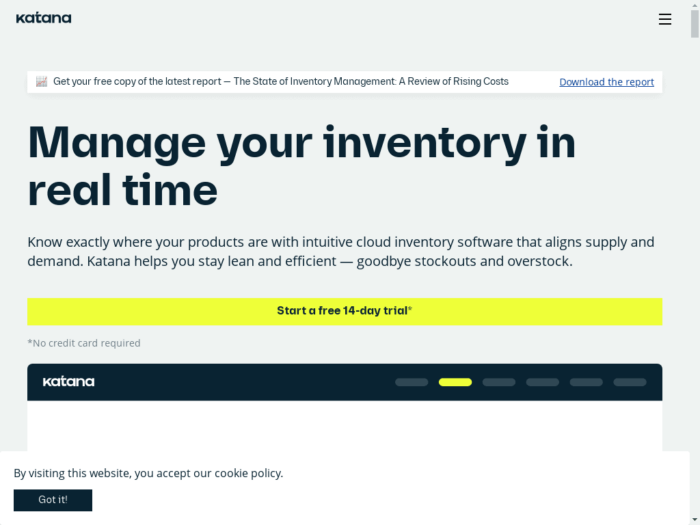
Katana was designed as an end-to-end inventory management software. It’s cloud based, which helps deliver great versatility.
As a web-based inventory management software, it can be easy to access from anywhere. You also have barcode part tracking, supplier logistics, production planning, storage and assembly tracking.
Moreover, they have workflow management, line inventory management, production and omnichannel sales management. Thanks to the cloud accounting, you also receive financial visibility. Moving your inventory to the cloud might seem quite challenging.
But with the efficient systems, custom API integrations and great speed, this is a great inventory management system software. You want to use this online inventory management software for a smaller business, but it can be great for larger companies as well.
Pricing:
Prices start at $99 for Essential, which covers 3 warehouses and up to 500 shipped sales orders per month. For 500 orders and extra features like tracking, you need to use the Advanced package which is $299. Professional is $599 and it covers up to 25000 shipped orders, along with all existing features and early access to new features.
Pros:
- It has a free 14-day trial
- A large number of features
- Complete integration with top platforms
- Very good tracking and order creation systems
Cons:
- Adding new users will cost quite a bit
- They don’t have live phone support
Best for: Manufacturers and companies that want a cloud based inventory system
8. inFlow Inventory
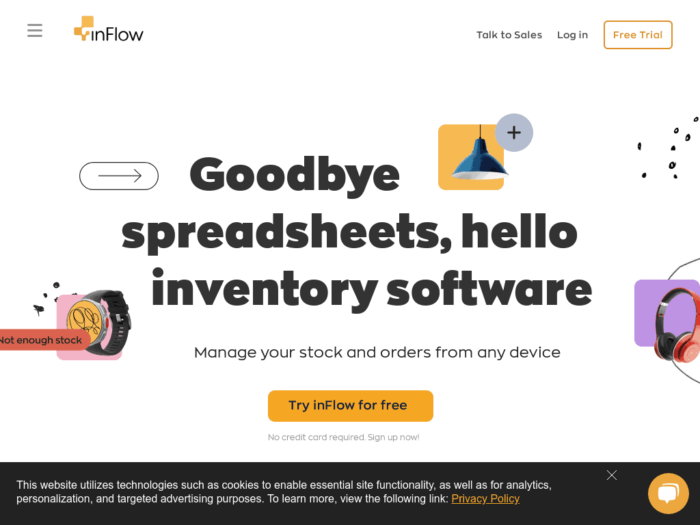
inFlow delivers a very good warehouse inventory management software. It can be particularly good for startups and the B2B companies. You can use it to cover things like parts, finished units, barcode tracking, etc.
They also do a very good job with purchasing automation and multi-warehouse management.
Additionally, the service has wholesale features, you can even create virtual showrooms using your inventory. On top of that, you have sales rep order routing, and you can set shipping times or minimum quantities. They also have live chat and live phone support.
If you need any help, their video tutorials and resource center are stacked with a lot of comprehensive info.
Pricing:
The Entrepreneur package covers 100 sales per month and 1 integration for $110 a month. Their small business package covers 5 team members, 1000 sales per month and more features for $279 a month. If you have 5000 sales per month or more and need more team members or extra features like the Showroom, you will have to pay $549 a month.
Pros:
- An incredible virtual showroom feature for your inventory
- One click quote systems that streamline ordering
- Sales rep tagging and order routing
Cons:
- The virtual showroom is locked to the most expensive tiers
- Their plans will force you to upgrade as you grow.
Best for: Wholesale businesses and B2B
9. Odoo
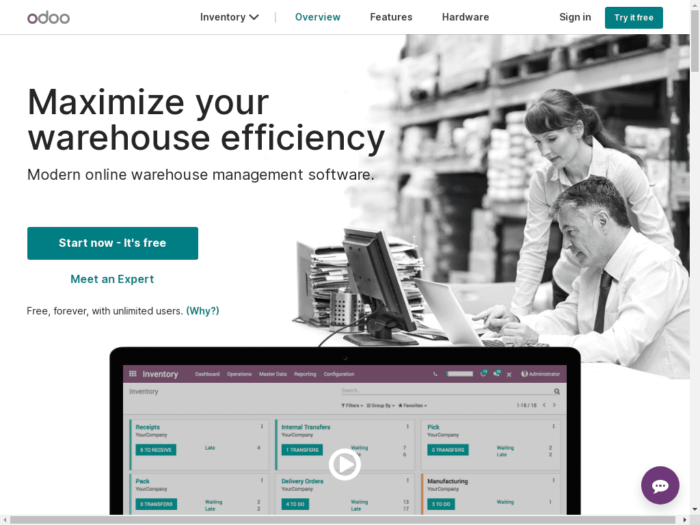
Odoo does a very good job at delivering an open source inventory management software. It allows you to organize your warehouse and track stocks automatically.
They also have a double entry inventory, and you can move stock between locations. It’s fully adjusted for multi-warehouse, cross-docking and dropshipping systems.
Their traceability systems are very impressive, and you also have complete and clear reporting solutions. You can also fully integrate with the other Odoo apps like Accounting, Purchase or Sales.
Pricing:
The app is free to access, but it offers various in-app purchases according to your specific needs.
Pros:
- It allows you to improve your performance and process time
- You can set the minimum and max quantity for reordering
- Suitable for cross-docking, multi-warehouse and dropshipping
- Very good traceability system
Cons:
- A lack of transparency when it comes to any pricing
- Less intuitive interface when compared to other tools
Best for: Businesses just starting up
How to Choose the Right Inventory Management Software?
Selecting the best inventory management software is always about your needs. You need to create a list with the requirements you have from such software.
It will help you better understand if you need a local or web-based inventory management software. Or you will know if you need a free inventory management software, instead of a paid solution.
Here are some of the things to look out for.
- See if the software has a learning curve, and how hard it can be to master the software and all of its features.
- POS system integration is a must-have. It makes it easier to streamline the inventory. You will also know what products are still available. That offers a clear insight into your current stock.
- Having an inventory catalog makes processing and managing items much easier. You can filter based on color, size and other features.
- Automated reordering is another great feature. Using this allows you to automatically place an order for anything low on stock. That way you’re never out of stock, and there’s no need for constant manual checks.
- Ecommerce integrations are a must too. They can make it easier to sell on multiple platforms, track your sales, etc. It will also make it easier to avoid any over-ordering too.
- Product cost analysis is helpful since it gives you an insight of how much you need to spend. It can also predict operating costs more efficiently.
- Forecasting can help identify any future demand from customer. Using this info, you will know an approximate number of products you need to order.
- There are other nice to have features too. These include things like barcoding, RFID capabilities, inventory management integrations.
Final Take: Best Inventory Management Software
Finding the right inventory management software for your business can be a huge undertaking. You want to use the best inventory management software that can easily scale as your business grows. Plus, you also want access to extra features and solutions.
We highly recommend giving any of these great tools a shot, since they offer exceptional services in the world of inventory management. On top of that, you can also use free inventory management software and then upgrade after the trial is over.
Give these a shot, and you will find it much easier to revolutionize your inventory management!
Continue Reading:
Shivbhadrasinh Gohil
Shivbhadrasinh is the Co-founder & Chief Marketing Officer at Meetanshi. He leads the marketing team and is the person behind the marketing & branding success of the company. Being a seasoned digital marketer, he has been consulting online businesses for growth since 2010 and has helped 100+ clients with digital marketing success.
He loves sharing tips and insights about the latest digital marketing trends aimed at helping online business owners.


Prev
10 Best Shopify Apps to Sell on Amazon [Free & Premium]
7 Best Shopify Apps For Language Translation
Next